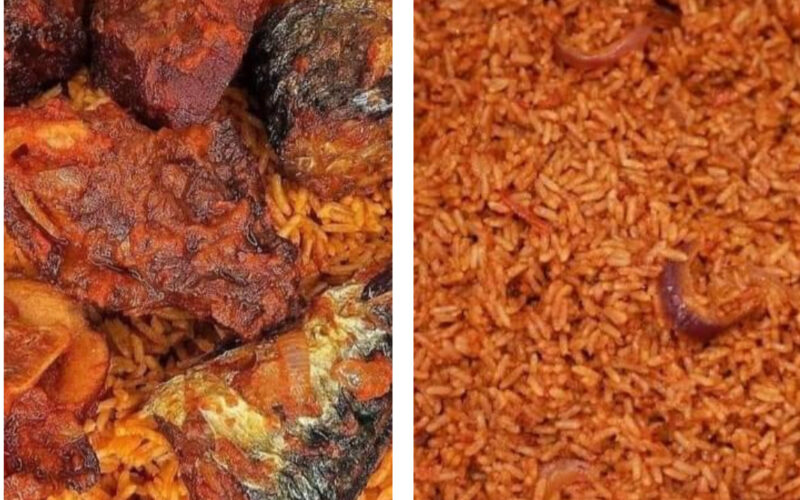The average cost of preparing a pot of jollof rice for a Nigerian family of five has more than tripled within seven years, according to a new Jollof Index report.
The report, titled ‘Mountain Climbing’, by SBM Intelligence, an Africa-focused geopolitical research and strategic communications consulting firm, shows that the cost of preparing a pot of the popular Nigerian delicacy rose by 220.7 percent to N13,106 in September 2023 from N4,087 in July 2016.
This means that a family of five that earns the monthly minimum wage of N30,000 would have to spend 43.7 percent of the pay to cook a pot of jollof.
A further analysis shows that the cost increased by 20.4 percent within seven months (March-September).
“This spike has strained Nigerian households, particularly those earning minimum wage,” the report said.
It said the transition to a new administration was anticipated to impact food prices positively. “However, two immediate policies enacted by the current government — the naira devaluation and the removal of petrol subsidies — have worsened food affordability and accessibility.”
Using the Jollof Index, SBM illustrates how food prices have changed over time. The data gathered monthly from 13 markets spread across the country’s six geopolitical zones is computed using the costs of the ingredients. It does not include December because of seasonal variations that cause price hikes.
The ingredients that make up the index are rice, groundnut oil, chicken or turkey, beef, seasoning, pepper, tomatoes, salt and onions. While the index has treaded close to food inflation since collection began in 2016, it has provided a simple way of communicating the realities of inflation to the Nigerian public.
“The prices of turkey, chicken, tin tomatoes and various seasonings have also increased, reflecting a broader inflationary trend. This upward trend extends to other staple foods across the country,” authors of the report said.
They added that the average cost of a bag of rice escalated from N50,000 in June to N56,000 in September, and that price increases are primarily attributed to the rising fuel costs, which are essential for food preservation and transportation, and the currency devaluation, which affects imports.
“Beyond the Jollof Index, we surveyed the prices of other staples such as bread, beans, tea, beverages and tubers. These all reflected a widespread price increase, making it harder for consumers to afford essential food items.”
The SBM report highlighted that across the 13 markets, Wuse II in Abuja is the most expensive place to make jollof rice at N15,900, while it is the cheapest in Onitsha, Anambra at N10,280.
A middle-aged woman in the North-West region surveyed by the SBM said most families cannot afford eggs, let alone fish or meat.
“They use gbeske (soybean cheese) as a substitute in their stew, while others simply use cabbage. Nobody does an egg per day for their children right now; it is as available, and even when available, it is cut into bits and pieces,” the report said.
Another trader in the South-West region noted that many shop owners are closing down their shops as they cannot afford to raise the money to restock while some others are taking loans from multiple sources to meet up with the price shocks.
“You cannot add a lot, as price increases might deter customers, and current prices barely cover market fees, shop rent or transport costs,” she said.
She added that many of her customers who buy fish from her have started buying dead chicken.
The Tinubu administration’s reforms such as the removal of petrol subsidy and naira devaluation, implemented in the second quarter of the year, increased the cost of living in the country.
The removal of the fuel subsidy tripled the petrol price to N617 from N184, causing public transportation providers such as buses, tricycles and motorcycles to raise fares.
The floating of the naira increased the official exchange rate from N463.38/$ to N791.75/$ on Friday while the parallel market rate stood at N1,135/$.
The high cost of dollars and the implementation of a 7.5 percent value added tax on diesel imports, which was suspended in September, pushed its pump price to as high as N1,200 per litre.
Inflation in Africa’s biggest economy rose to an 18-year high of 27.33 percent in October from 26.72 percent in the previous month, worsening the cost-of-living crisis facing many households. Food inflation also increased to 31.52 percent from 30.64 percent.
“The subsidy’s removal will continue to add to inflation, partly through second-round effects. And the naira’s fall in value against the dollar will continue to push up inflation too. As a result, we expect inflation to rise to more than 30 percent by early 2024,” David Omojomolo, Africa economist at London-based Capital Economics, said.
According to the latest Nigeria Development Update report by the World Bank, the loss of purchasing power from high inflation pushed an additional four million people into poverty in the first five months of this year.
“The removal of the petrol subsidy has caused an increase in prices, adversely affecting poor and economically insecure Nigerian households,” the report said.
The World Bank projected that the poor and economically insecure households will face an equivalent income loss of N5, 700 per month, and without compensation, an additional 7.1 million people will be pushed into poverty.
A recent survey by SBM Intelligence found that Nigerians said they were spending 97 percent of their monthly income on food.
Earlier in the month, some fish sellers in Ogun State protested the incessant increase in the prices of fish, and a video has gone viral of a fish seller groaning about surging fish prices and low patronage.
Analysts at SBM recommend that the cumulative effect of these challenges highlights the urgency for effective policy responses to stabilise the food market and ensure access and affordability for the average Nigerian.
“Protests over high food prices and increasing costs have already begun in various parts of the country, including those by labour unions, frozen food retailers in Delta, and poultry farmers in Ogun State, among others. These protests signal potential unrest that demands immediate attention,” they said.




